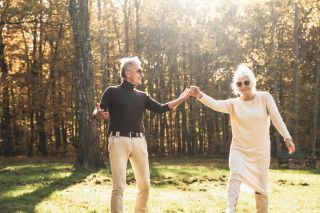Aging
How to Age Fearlessly
Approach aging with confidence and optimism.
Posted March 10, 2024 Reviewed by Jessica Schrader
Key points
- While some of our fears about aging can be realistic, many can be self-limiting and harmful.
- Becoming more aware of negative aging stereotypes can help you think differently about aging.
- Having positive role models and thinking about what you'll gain with age can instill optimism.
Most people have their fair share of hang-ups about aging. Your body doesn’t feel like it used to. You have to pace yourself differently. You’re relying more on others. Your memory doesn’t always, oh, what’s the word, ah yes—cooperate. Then there’s how society sees older adults: irrelevant, incapable, cognitively impaired, stuck in their ways, and perhaps worst of all, cute.
Our fears about aging are not unfounded. There are a myriad of ways in which later life is incredibly challenging. Ask an older adult who has a degenerative condition that prevents them from walking independently, or someone dealing with an ageist health care provider, or another who is caregiving for an ailing spouse how they feel about aging and they may tell you a similar story: it’s not for the faint of heart.

As much as some of our fears about aging can be realistic, they can also be incredibly self-limiting. Believing in negative stereotypes about aging can make it hard to live a full, vibrant life as you get older. It may also cut years off of your life. There’s research suggesting that holding negative attitudes about aging is associated with negative health outcomes and a higher risk of mortality.
So how do you start thinking about aging with a healthy dose of fearlessness and optimism?
Raise Awareness of Ageist Stereotypes
The first step you can take to transform your beliefs about aging is to raise awareness of all of the subtle and not-so-subtle stereotypes about older adults that reside in our collective consciousness. Look no further than the greeting card aisle at your local supermarket to find many of them. Older adults are unattractive, asexual, cognitively impaired, inept, helpless, clueless, cranky, and stubborn. Pretty terrible, huh? It’s important to try to catch how these not-always-conscious beliefs influence how we view older adults and ourselves. On a recent Uber ride with a driver who I figured to be in his 70s, I had the embarrassingly automatic thought that I wouldn’t make it to the airport on time. But guess who knew the city like the back of his hand and was able to find the best shortcuts? My driver. And guess who felt terrible for making an ageist assumption? Yours truly.
Find Role Models that Defy the Stereotypes

The people in our lives set the tone for how we think about growing older and we can use this to our advantage to reshape the well-ingrained stereotypes of aging. Pay attention to the older adults in your life who inspire you. Maybe they're going back to university, climbing Mount Kilimanjaro, volunteering for a cause they feel passionate about, embarking on a career change, having a vibrant dating life, or learning a new language. If you don’t personally know any of these people, look to the many different public examples we have of older adults doing incredible, non-stereotypical things. I’ve had the pleasure of seeing Patti Smith in concert who, at 77 years old, is not only still touring but is among the most captivating performers I've ever seen.
Look at the Gains and Not Just the Losses
Much of the broader narrative about aging is one of decline, loss, and despair. Not only is this incredibly depressing, it doesn’t reflect the bigger picture of later life, which is full of positive changes that we talk less about. Social scientists have coined the term the “paradox of aging” to refer to the wide range of psychosocial and emotional benefits that come with age. Older adults tend to be more content and emotionally stable than their younger counterparts, are more focused on the present, and have more clarity on who they are and what matters most to them. So instead of just focusing on what you might lose as you age, consider what you might gain.

Behave Your Way Into Feeling Differently About Aging
To feel more optimistic about aging, we don’t have to exclusively focus on changing our thoughts. Sometimes it’s easier to behave our way into feeling differently. Let’s start with the assumption that your thoughts, emotions, and behaviour influence each other. If you believe that “you can’t teach an old dog new tricks,” you’ll likely feel less inclined to learn something new or go outside your comfort zone. You’ll be saying “no” to Spanish lessons, participating in psychotherapy, or going to a concert with your grandson. There’s no better way to stay stuck in your thinking than by limiting what you're doing.
If we shift the focus to changing our behaviour—and for many of us, that means saying “yes” to the things we think we can’t or shouldn’t—we get access to new information and experiences that can transform how we think and feel. It may help you see that there isn’t really an expiration date on learning, adventure, personal growth, or discovery. What if it was never too late to live your best life?
References
Carstensen, L. L. (2019). Integrating cognitive and emotion paradigms to address the paradox of aging. Cognition and Emotion, 33(1), 119-125
Carstensen, L. L., Turan, B., Scheibe, S., Ram, N., Ersner-Hershfield, H., Samanez-Larkin, G. R., ... & Nesselroade, J. R. (2011). Emotional experience improves with age: evidence based on over 10 years of experience sampling. Psychology and aging, 26(1), 21
Charles, S. T., & Carstensen, L. L. (2010). Social and emotional aging. Annual review of psychology, 61, 383-409.
Levy, B. R., Slade, M. D., Chung, P. H., & Gill, T. M. (2015). Resiliency over time of elders’ age stereotypes after encountering stressful events. Journal of Gerontology. Series B, Psychological Sciences and Social Sciences, 70(6), 886–890. https://doi.org/10.1093/geronb/gbu082
Levy, B. R., Slade, M. D., & Kasl, S. V. (2002). Longitudinal benefit of positive self-perceptions of aging on functional health. Journal of Gerontology. Series B, Psychological Sciences and Social Sciences, 57(5), 409–417. https://doi. org/10.1093/geronb/57.5.P409
Levy, B. R., Slade, M. D., Kunkel, S. R., & Kasl, S. V. (2002). Longevity increased by positive self-perceptions of aging. Journal of Personality and Social Psychology, 83(2), 261–270. https://doi.org/10.1037//0022-3514.83.2.261


